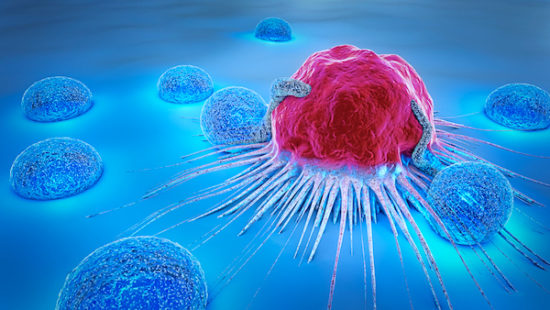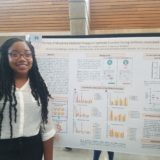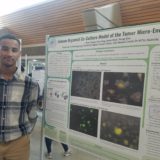
Vanderbilt Summer Science Academy
More than 150 undergraduate students from institutions across the nation shared their research and discovery as part of the
17th Annual Student Research Symposium.
VSSA participants used the symposium,held at the School of Engineering, as an opportunity to showcase their research accomplishments and the skills they learned during the summer while working in labs and departments across Vanderbilt’s campus. Throughout the nine-week VSSA program, students completed a research project under the leadership of a research mentor and some students also had the opportunity to observe clinical patient care while spending time with residents and attending physicians. Students can apply to one of two programs: the Basic Sciences Programs for undergraduates interested in careers in research, as well as the Undergraduate Clinical Research Internship Program for undergraduates interested in practicing medicine. For more information about the Vanderbilt Summer Science Academy, visit medschool.vanderbilt.edu/vssa/.
The Meharry/Vanderbilt/Tennessee Cancer Partnership (MVTCP) and CURE funding sponsored 6 local high school students and 7 Undergraduate students at this years VSSA academy.

Vincent Buckman from Washington and Lee University is a Gates Millennium Scholar. He worked in the lab of Pierre Massion this summer and presented his poster at the symposium. His poster presentation was “XCT Knockout Increases Radiation Sensitivity in an In Vitro Model of NSCLC”.
 Simone Lee attends Cornell University and worked in Marianna Byndloss lab this summer. Her poster presentation was on, ” The role of Microbiota-Mediated Changes in Epithelia Function During Antibiotic-Associated Obesity.” Simone Lee attends Cornell University and worked in Marianna Byndloss lab this summer. Her poster presentation was on, ” The role of Microbiota-Mediated Changes in Epithelia Function During Antibiotic-Associated Obesity.”

Brian Young is currently attending Harvard University and worked in Young Kim’s lab, Department of Otolaryngology at VICC. His research this summer was with Organoids, the poster presentation was titled, “Immune Organoid Co-Culture Model of the Tumor Micro-Environment”
Antonio Glenn worked in the Biomedical engineering lab of Micheal King and his research entailed,”TRAIL-Coated Leukocytes to Kill Circulating Tumor Cells in Blood form Prostate Cancer Patients.” Antonio attends Vanderbilt University.
Anesha Walker assisted in the Engineering lab of Dr. Rafat. Anesha is a senior Biology major at Tennessee State University and the name of her project was, “Evaluating Neutrophil Infiltration in Irradiated Tissues”.
.
Mariel Liggin is a Tennessee State University student, and she interned with us from Summer 2018 through Summer 2019. Her project title was: “Cancer Risks among CHEK2 & ATM Carriers: A Study Based on Participants in the Inherited Cancer Registry (ICARE). ”
Keanna Johnson from Tennessee State University worked in Julie Sterlings lab this summer on the project, “A Kinetic Model of Tumor-Induced Bone Disease.”
Our local High school students:
Kyra Thomas and Samaya Muhumad who joined Ken Lau lab’s this summer working in the area of micro fabrication for single-cell genomics.
Zulema Elvira returned again to our program this summer and worked in Rachelle Johnson’s lab, her work this summer was, ” The role of PTHrP in regulating dormancy genes.”
Jimmy Barajas worked in Julie Sterling’s lab learning about the “Investigating macrophages and osteoclast differentiation in tumor-induced bone disease.”
Anastasia Shostak joined the Chemical and Biomolecular Engineering
department with Dr Rafat. Her research was in the area of “Studying the Irradiated Micro environment using Extracellular Matrix Hydrogels. Evaluating Radiation Response in the Mammary Fat Pad”
Avery Robinson was in the Department of Pharmacology lab of Barbara Fingleton and the research project he worked on was, “Pro-metastatic targets of IL4 in breast cancer.”
It was our pleasure to host you at this summer’s academy and we wish you all success in your future careers as scientists!!
ImmersionHub has launched 
Vanderbilt students and faculty now have access to ImmersionHub, a project management system designed to track the progress of Immersion Vanderbilt projects and provide information about the recently launched undergraduate degree requirement.
Vanderbilt students and faculty now have access to ImmersionHub, a project management system designed to track the progress of Immersion Vanderbilt projects and provide information about the recently launched undergraduate degree requirement.
“The launch of ImmersionHub is exciting news,” said Vanessa Beasley, vice provost for academic affairs. “Now faculty will be able to advertise opportunities for students to get involved in their research and other projects, and students will be able to read about what’s available across campus and then submit their plans and track their progress.”
ImmersionHub provides two basic resources to undergraduate students pursuing the Immersion requirement and the faculty who are mentoring them through the process: a student plan proposal system and an opportunities database.
“The ImmersionHub system is a project management tool that will streamline the process students follow to submit plans, track their experiences, and eventually submit their final projects. The Office of Immersion Resources is energized by the ideas the students have already shared with us and is poised to advise and facilitate now that the system is launched,” said Carolyn Floyd, director of the Office of Immersion Resources.
Direct links and information about ImmersionHub can be found on the
Immersion Vanderbilt website

Predicting the outcome of MIMO systems
Click on the hyper link above for the detail information on the complexity of multi-input/multi-output (MIMO)
systems led by the labs of Carlos Lopez
(Biochemistry) and
Larry Marnett (Biochemistry) to use a systems biochemistry approach, combining
physiochemical modeling and information theory, to probe the complexity of cyclooxygenase 2 a llostery.

Xiao Ou Shu, MD, PhD, MPH, associate director for Global Health and co-leader of the Cancer Epidemiology Research Program at Vanderbilt-Ingram Cancer Center, and Wei Zheng, MD, PhD, director of the Vanderbilt Epidemiology Center and Anne Potter Wilson Chair in Medicine, received the medals in July. Shu led a team of Vanderbilt researchers on a program to build research capacity in Vietnam that is supported primarily by a grant from the National Cancer Institute’s (NCI) Center for Global Health. This grant is part of NCI initiative to create and support Regional Centers of Research Excellence for non-communicable diseases in low- and middle-income countries or regions. Shu is the lead principal investigator of this grant.
 “We know that disease has no borders,” Shu said. “This research benefits America also because what we learn in another country can be transferred back to the U.S. populations, particularly for some lifestyle habits, such as diet and exercise, and genetic factors that are difficult to study in this country due to their low prevalence.” “We know that disease has no borders,” Shu said. “This research benefits America also because what we learn in another country can be transferred back to the U.S. populations, particularly for some lifestyle habits, such as diet and exercise, and genetic factors that are difficult to study in this country due to their low prevalence.”
She cited as an example a previous study she led on soy intake among breast cancer survivors that revealed soy products in the diet were associated with a reduced breast cancer recurrence rate even though they contain large amounts of isoflavones that bind to estrogen receptors in cells. Estrogen is a hormone that has been linked to cancer growth, particularly in breast cancer. The study showed that women who ate the most soy food, more than 11.83 mg isoflavones per day, had a 27% reduced rate for breast cancer recurrence compared to those who had the lowest intake. Such a study would have been difficult to conduct without using a Chinese-based population-based study because soy is not commonly consumed in the U.S. and consumption is low and difficult to measure, Shu said. This finding has led to a change of dietary guidelines from the American Cancer Society for breast cancer survivors.
“Non-communicable diseases have now become a problem for Vietnam as the society has transitioned from a low-income population to some extent a middle-income population now,” Zheng said. “Chronic diseases have become more common.”
The work in Vietnam began in 2015 when Shu and Zheng traveled there for a needs assessment. In 2017, Shu obtained a two-year NCI grant along with Thuan Van Tran, MD, director of the Vietnam National Cancer Hospital as the joint principal investigators.
Zheng said he welcomed the opportunity to help make a difference in Vietnam. “They need this kind of help and we have the capacity to help them,” he said. Shu said Vietnam has an opportunity to prevent some chronic diseases related to diet and lifestyle.
“You put out the fire before it gets aflame,” she said. “That’s important.”

FUNDING OPPORTUNITIES:
Continuing Umbrella of Research Experiences (CURE) Overview
Continuing Umbrella of Research Experiences (CURE) is a national research-training and career-development initiative that focuses on building and sustaining a pipeline of diverse cancer investigators. CURE provides training opportunities for underrepresented students and trainees across the academic continuum in order to diversify the workforce in cancer and/or cancer health disparities research.
The CURE program offers students from high school through graduate school, postdoctoral trainees, and early-stage investigators cancer research training and career development funding opportunities. You are encouraged to contact a CURE program director before applying for funding (see FOA and contact addresses below).
For more information about CURE, please visit their website at:
https://www.cancer.gov/about-nci/organization/crchd/diversity-training/cure.
CURE Funding Opportunities and Deadline Reminders
NCI Kirschstein-NRSA Individual Predoctoral Fellowship to Promote Diversity in Health-Related Research (F31) | Applications are due April 8, Aug. 8, and Dec. 8, 2019 | PA-19-196
Diversity Research Supplements (New) | Apply between Feb. 1 – March. 30 and Oct. 1 – Dec. 1, 2019 | PA-18-586
Re-entry supplement FOA (New) | Apply between Feb. 1 – March. 30 and Oct.1 – Dec 1, 2019 | PA-18-592 (please use these updated Diversity Supplements Guidelines and Re-Entry Supplements Guidelines along with DS fact sheet to prepare your application).
NCI Mentored Research Scientist Development Award to Promote Diversity (K01) | Applications are due Feb.12, June 12, and Oct. 12, 2019 | PAR-18-364 | PAR-18-365
NCI Mentored Clinical Scientist Research Career Development Award to Promote Diversity (K08) | Applications are due Feb.12, June 12, and Oct. 12, 2019 | PAR-18-337 | PAR-18-336
NCI Transition Career Development Award to Promote Diversity (K22) | Applications are due Feb.12, June 12, and Oct. 12, 2019 | PAR-18-366 | PAR-18-367
Exploratory/Developmental Grants Program for Basic Research in Cancer Health Disparities (R21 Clinical Trial Not Allowed) | Applications are due June 19 and Nov. 19, 2019 | PAR-18-655
Exploratory Grant Award to Promote Workforce Diversity in Basic Cancer Research (R21 Clinical Trial Not Allowed) | Application are due June 19 and Nov.19, 2018 | PAR-18-731
Basic Research in Cancer Health Disparities (R01 Clinical Trial Not Allowed) | Applications are due June 19 and Nov. 19, 2019 | PAR-18-654
National Cancer Institute Youth Enjoy Science Research Education Program (R25) | Application are due September 25, 2019 | PAR-17-059
Contact the CURE Program Directors for more information.
Sara Hargrave, Ph.D. (Diversity Supplements); hargrave@nih.gov and/or CURE supplements@nih.gov
Alison Lin, Ph.D. (Diversity Supplements, R25 YES); lin@nih.gov and/or CURE supplements@nih.gov
Nicole McNeil Ford, Ph.D. (F31); mcneiln@mail.nih.gov
John Ojeifo, M.D., Ph.D. (K08); ojeifojo@mail.nih.gov
Elena Schwartz, Ph.D. (K01, K22, R21 WD); schwartz@nih.gov
NIH Guide
If you have not already done so, you are encouraged to subscribe to the NIH Guide email list, which provides a wealth of information on NIH grant programs.
New NIH F33 grant opens for NIGMS-funded PIs
This F33 is targeted toward experienced scientists who wish to make major changes in the direction of their research careers or who wish to broaden their scientific background by acquiring new research capabilities. Standard application dates apply to this grant.

Send us your news
Have a suggestion for a Cancer Biology newsletter item? Do you have an announcement or an upcoming event you want to share with the Cancer Biology community?
E-mail: kerry.w.vazquez@vanderbilt.edu
Newsletter header photo credit to Dr. Anna Vilgelm, “DNA Comets”.
Credit for the Wei Zheng & Xiao-ou Shu, article goes to Tom Wilemon and the Tennessean. Photo credit Susan Urmy. Clip art credit to Bing. NCI/NIH funding opportunities credit to NIH/NCI.
|
![Medicine - Cancer Biology E-Newsletter [Vanderbilt University]](https://cdn.vanderbilt.edu/vu-URL/wp-content/uploads/sites/119/2017/11/19151037/cancer-biology-design-004.png)